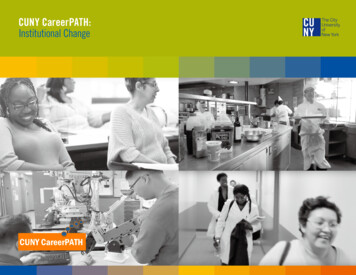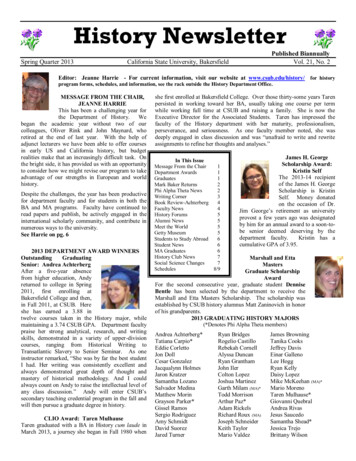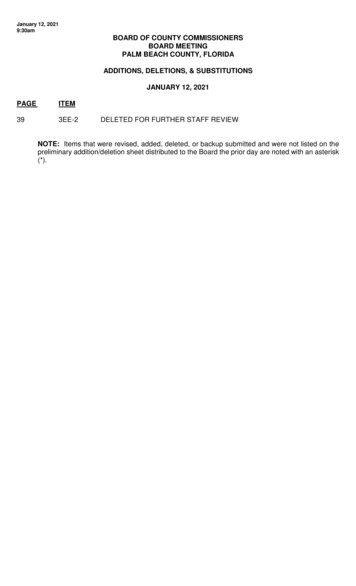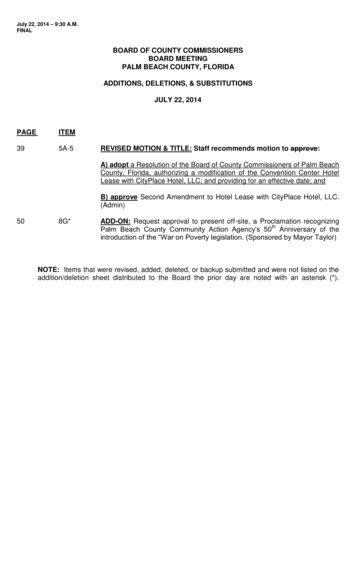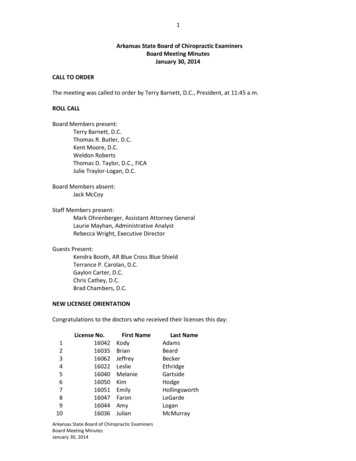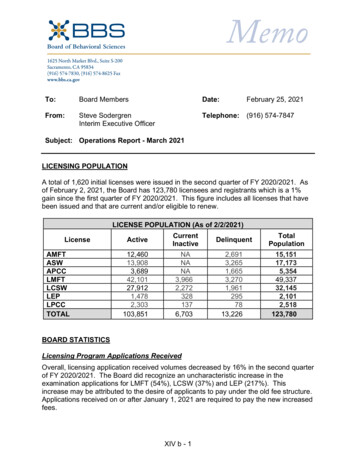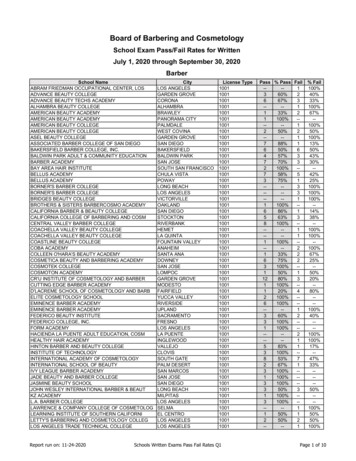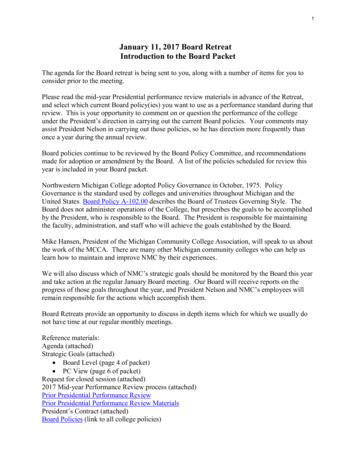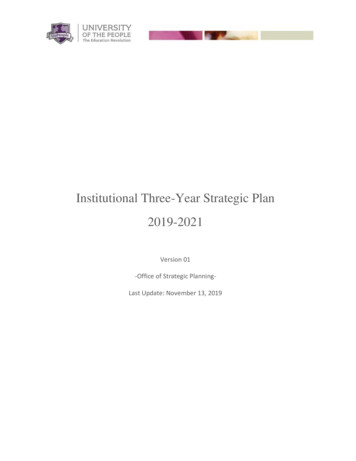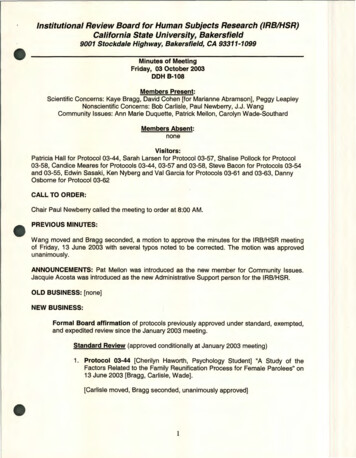
Transcription
Institutional Review Board for Human Subjects Research (IRBIHSR)California State University, Bakersfield9001 Stockdale Highway, Bakersfield, CA 93311-1099Minutes of MeetingFriday, 03 October 2003DOH B-108Members Present:Scientific Concerns: Kaye Bragg, David Cohen [for Marianne Abramson], Peggy LeapleyNonscientific Concerns: Bob Carlisle, Paul Newberry, J.J. WangCommunity Issues: Ann Marie Duquette, Patrick Mellon, Carolyn Wade-SouthardMembers Absent:noneVisitors:Patricia Hall for Protocol 03-44, Sarah Larsen for Protocol 03-57, Shalise Pollock for Protocol03-58, Candice Meares for Protocols 03-44, 03-57 and 03-58, Steve Bacon for Protocols 03-54and 03-55, Edwin Sasaki, Ken Nyberg and Val Garcia for Protocols 03-61 and 03-63, DannyOsborne for Protocol 03-62CALL TO ORDER:Chair Paul Newberry called the meeting to order at 8:00 AM.PREVIOUS MINUTES:Wang moved and Bragg seconded, a motion to approve the minutes for the IRB/HSR meetingof Friday, 13 June 2003 with several typos noted to be corrected. The motion was approvedunanimously.ANNOUNCEMENTS: Pat Mellon was introduced as the new member for Community Issues.Jacquie Acosta was introduced as the new Administrative Support person for the IRB/HSR.OLD BUSINESS: [none]NEW BUSINESS:Formal Board affirmation of protocols previously approved under standard, exempted,and expedited review since the January 2003 meeting.Standard Review (approved conditionally at January 2003 meeting)1. Protocol 03-44 [Cherilyn Haworth, Psychology Student] "A Study of theFactors Related to the Family Reunification Process for Female Parolees" on13 June 2003 [Bragg, Carlisle, Wade].[Carlisle moved, Bragg seconded, unanimously approved] 1
Expedited Review1. Protocol 03-47 (Mary Foster, MSW Student) "Bi-Cultural IdentificationIssues in International Adoptive Families" on 04 August 2003. [Carlisle,Leapley] 2. Protocol 03-49 (Adiel Uzabakiriho, MSW Student) "An Exploratory Study ofRefugee Immigrant Experiences in the United States" on 20 August 2003.[Bragg, Newberry][Leapley moved, Wang seconded, unanimously approved]Exempted from Full Review1. Protocol 03-45 (Janet Zaldua, PPA Student) "The Impact of ParentInvolvement on Student Success: How Educators Can ImplementPartnerships with Parents to Meet the Needs of Hispanic Students" on 06June 2003.2. Protocol 03-46 (Ken Trone, PPA Student) "New Residential Development'sResponsibility to Fund Cost of New Local Parks" on 26 June 2003.3. Protocol 03-48 (Steve Bacon, Psychology Department) "College Norms forthe Scale of Functional Ability Ratings [SOFAR]" on 25 June 2003.4. Protocol 03-50 (Jo Lynn Feinstein, Claremont Graduate Student) "AnEvaluative Assessment of the Generally Accepted University Credit-AwardingSystem" on 01 August 2003 . 5. Protocol 03-52 (Cheryl Piccirilli, Education Student) "The Effectiveness ofImplementing a Read Aloud Program on the Attitudes toward Reading of aGroup of Third Graders" on 10 September 2003.[Bragg moved, Wang seconded, unanimously approved]Formal Board affirmation of protocols submitted and designated as not falling withinthe IRB/HSR definition of human subjects research (not within IRB/HSR purview) sincethe January 2003 meeting.[none]Formal Board affirmation of previously approved protocols granted extensions sincethe January 2003 meeting.It was noted that the authors of six protocols listed as closed in the agenda haverequested extensions since the agenda was printed. These have been added tothe Extensions listed here and deleted from the Closure list in these minutes.:. 1. Protocol 01-52 (John Valdez, PPA Student) "The Influence of Cyberspace,Society, and the Internet" on 06 June 2003 .2. Protocol 02-50 (R. Steven Daniels, PPA) "Agency Merger andOrganizational Transformation in the Department of Homeland Security" on04 June 2003.2
3. Protocol 02-77 (Andrew Alvarado, Fresno State University) "Central ValleyNursing Diversity Program Evaluation" on 16 September 2003.4. Protocol 02-63 (Steve Suter, Psychology) "Visual Neuroscience LabAssignments and Research Projects for 2002-2003" on 19 September 2003.5. Protocol 01-38 (Marianne Abramson, Psychology Department) "Vowel andConsonant Length Effects in Sentence Verification" end of September 2003.6. Protocol 01-45 (J. Daniel McMillin, Applied Research Center) "San JoaquinCommunity Hospital - Diabetes Demonstration Project Evaluation" end ofSeptember 2003.7. Protocol 01-46 (J. Daniel McMillin, Applied Research Center) , "KGDepartment of Public Health - KG Tobacco Education Program (TEP)Evaluation" end of September 2003.8. Protocol 02-02 (Marianne Abramson, Psychology Department) "Relatednessend ofEffects and Memory for Voice Attributes in Silent Reading"September 2003.9. Protocol 02-67 (David Georgi, Teacher Education) "How Has Participation inTechnology Projects Changed Instructional Practice?" end of September2003.10. Protocol 02-68 (David Georgi, Teacher Education) "What Are PerceivedUses of and Problems with TaskStream in Teacher?" end of September2003.[Wang moved, Carlisle seconded, unanimously approved]Formal Board action closing protocols (unlessauthorization will end prior to the next IRB meeting.extensionrequested)whose1. Protocol 01-11 (Jess Deegan, Psychology Department) "Sex, SexualOrientation, and Gender Identity: Do These Impact Cognitive Task BatteryResults?" end of December 2003.2. Protocol 01-43 (Kenneth Nyberg, Applied Research Center) "CaliforniaDepartment of Transportation Highway Maintenance Program DriverSatisfaction Survey" end of September 2003.3. Protocol 01-47 (Kathleen Gilchrist, Department of Nursing) "It's Really AllAbout Chocolate . .Lived Experiences of Beginning Baccalaureate NursingStudents" end of September 2003.4. Protocol 02-55 (Lu Royce Anne Bishop, Education Student) "Participation inSelf-Expressive Esteem Building Art May Have a Counteractive Effect Uponthe Aggressive Behavior of High School Students" end of December 2003.5. Protocol 02.:.58 (Martin Cortez, MSW Student) "A Study of the DemographicFactors and Social Support Systems of Single Room Occupancy Residentsin Old Town Kern" end of September 2003.3
6. Protocol 02-59 (Cary Larson-McKay, Child, Adolescent & Family Studies)"On-Line Classes as a Factor in Family Functioning" end of September 2003.7. Protocol 02-60 (Cary Larson-McKay, Child, Adolescent & Family Studies)"Grandparents on Parenting--Wisdom of the Generations" end of September2003.8. Protocol 02-61 (Cary Larson-McKay, Child, Adolescent & Family Studies)"The Kindness of Children" end of September 2003.9. Protocol 02-62 (Ben Perlado, Public Policy and Administration Student) "AStudy of Student Service Programs in Kern County for the Encouragement ofHigher Education" end of September 2003.10. Protocol 02-64 (Laramee Lyda-Craft, Psychology Student) "PsychologicalContracts" end of September 2003.11. Protocol 02-65 (Kathleen Munsell) "Pet Attitude Scale Revision" end ofSeptember 2003.12. Protocol 02-66 (Lisa Freiberg, MSW Student) "Antecedents and Causes toRetention and Turnover Amongst Employed Child Protective ServiceWorkers" end of September 2003.13. Protocol 02-69 (Susan M. Schaufelberger, Nursing Student) "Nurses'Knowledge of Pressure Ulcer Prevention, Staging, and Description: AReplication" end of September 2003.14. Protocol 02-70 (Cary Larson-McKay, Child, Adolescent, & Family Studies)"Early Literacy" end of October 2003.15. Protocol 02-73 (Chandrasekhar Commuri, Public Policy & Administration)"Community Activists' Role in Nonprofit Service Determination in Bakersfield"end of September 2003.16. Protocol 02-74 (Debra Morrison-Orton, Social Work) " The Effect of BurnoutTraining on child Protection Services Workers' Intentions . " end of October2003.17. Protocol 02-75 (Christina Brown, CSUB AV Psychology Student) "TheEffects of Aesthetics and Responsibility on Likeability of People with VisibleStigmas" end of October 2003.18. Protocol 02-79 (Carla Anita Tucker, PPA Student) "Decreasing the Disparityof Homeownership Between Minorities and Non-minorities Through EffectiveHome-buying Programs" end of December 2003.19. Protocol 02-80 (Stanley Eugene Clark, Political Science) "Latino PoliticalLeaders in California's Southern San Joaquin Valley'' end of December2003.4
20. Protocol 02-81 (Stanley Eugene Clark, Political Science) "Culture, Food, andthe Economics of Mexican Restaurants in California" end of December2003.21 . Protocol 02-82 (Patricia Campion, Applied Research Center) "QualitativeEvaluation: Implementation of Family Resource Centers in Kings County"end of December 2003.22. Protocol 02-83 (Niki Tucker, Social Work Student) "Public Perception ofSocial Workers in Bakersfield" end of December 2003.23. Protocol 02-84 (Francisco Javier Llamas, History Student) "Missing Stories:The Chicano Experience in the Vietnam War" end of December 2003.24. Protocol 03-01 (Debra Wilson, Nursing Student) "Quality Care at the EndOf-Life: Identifying Factors That Affect Decisions Made by Families ofSeriously Ill Patients" end of December 2003.25. Protocol 03-02 (Michael Dulle, PPA Student) "Kern County In-HomeSupportive Services Consumer Survey and Needs Assessment" end ofDecember 2003.26. Protocol 03-04 (Douglas W. Robinson) "Reframing Higher Education Withinthe California State University'' end of December 2003.27. Protocol 03-07 (Jarrett Fisher, PPA Student) "A Study of the Management &Operational Productivity of the CSUB Career Beginnings Program" end ofDecember 2003.28. Protocol 03-08 (Amy Zachary, Nursing Student) "Perceptions of Rural NursePractitioners: The Experience of Providing Primary Care" end of December2003.29. Protocol 03-10 (Carla Tucker, PPA Student) "An Evaluation of the IntensiveEnglish Language Center's Service Delivery Options" end of December2003.[Bragg moved, Carlisle seconded, unanimously approved]Protocol Reviews:1. Protocol 03-53 "The Bulimic Patient's Perception of Health Care" with PatriciaK. Hall, Nursing Student. [Cohen, Newberry, Duquette]Following a round of introductions, Hall summarized the proposal. She wishes to explorewhether patient perceptions of health care for bulimia is related to whether and howthese patients seek health care. Participants will be recruited from a bulimia self-helpgroup. The research is qualitative. Questions followed.Q: Do you suspect that there is a problem with treatment of this disorder? A: Shehas noted negative comments from patients about the services of their providers.Q: Do these comments suggest that patient perceptions might prevent their seekingtreatment? A: Yes.5
Q: How will you recruit your participants? A: By announcing the research at meetingsand handing out flyers with contact information on them.Q: Will data by stored at home? A: Yes, in a locked file cabinet.Q: You need to make clear that if distressed, a participant may terminate theirparticipation and that non-participation or termination will not affect their care. A:Will do.Q: You need to clarify the duration of possible follow-up contacts on the consentform. A: Will do.Q: How long will you keep the data? A: [Investigator was not sure. It was agreed tohave a one year period specified after which the personal identifiers would bedestroyed, but the data could be kept].Q: What about potential participants who speak/read Spanish only? A: I wasconcerned about confidentiality in adding a translator, so they will not beincluded.Q: Need to be more clear about what happens if a participant becomes distressed.A: Will do.Q: Typos were noted on the demographic data survey materials A: These will becorrected.Q: You need to clarify in the protocol how confidentiality will be maintained withrespect to the name and consent form . A: Will do.Q: Consent form needs to indicate the participant will get a copy. A: Will do.Q: Are there any benefits to the participants of being in this study? If so, thisbelongs in the consent form. A: Will consider this.Q: In what order will the materials in the appendices be administered? A: Consentform first, then the others.The investigator was excused and more discussion followed. The IRB/HSR arrived atseveral conditions of approval:1. Adding a confidentiality statement to be signed by the transcriber.2. Edit the protocol for clarity re explaining how possible distress of a participantwill be handled.3. State in both the protocol and the consent form the specifics of howconfidentiality will be maintained.4. Add the following elements to the consent form:a. The decision to participate or not will not affect their care.b. The follow-up period for potential contact is one year.6
c. When the data will be destroyed.d. That the participant will receive a copy.e. "For questions regarding my rights as a research participant I maycontact" [the RERC].There was a motion for conditional approval of the protocol. [Duquette moved, WadeSouthard seconded, unanimously approved]. It was explained to the investigator that theresearch could proceed when the conditions have been satisfied.2. Protocol 03-57 "The Lived Experiences of Heterosexual Woman with HIV" withSarah E. Larsen, Nursing Student. [Cohen, Newberry, Wade-Southard]Following a round of introductions, Larsen summarized the proposal. Little is knownabout the lived experiences of heterosexual women with HIV. Data collected might behelpful for prevention and treatment. Women will be recruited via two community mentalhealth agencies and interviewed. The research is qualitative. Questions followed.Q: Please clarify the purpose of this study. What do you expect to find? A: I'mprimarily interested in the health promotion practices of participants.Q: What are you getting at with Question #2? You'll get more useful results with aquestion that is clearer. A: Yes, will clarify.Q: What will you do if there is mental illness, which is common in this population? Isthis an exclusion factor? A: I haven't thought about that.Q: How will the data be stored? A: At home in a locked file cabinet.Q: You state in the protocol that there will be complete anonymity, but that is nottrue. That needs to be fixed in the protocol A: Will do.Q: You state in the protocol, and in the letter to potential participants, that all datawill be confidential , but you need to specifically state the extent of this and howthis will be accomplished in both documents. A: Will do.Q: How will you recruit your participants? A: I will talk with support personnel at theagencies.Q: At the top of your consent form you try to state the purpose of your research, butthis needs to be much more clear. A: Will do.Q: You need to devise a way and explain it in the consent form, for services toparticipants to be totally independent of their participation in this study. A: Willdo.Q: In the consent form state that the investigator can associate your name anddata. A: Will do.Q: You need to simplify the general terminology in the consent form. A: Will do.Q: State the time period of potential re-contact on the consent form. A: Will do.7
Q: Please add a confidentiality statement for the transcriber to sign. A: Will do.Q: In both the protocol and consent form you need to explain more clearly how youwould deal with a distressed participant. A: Will do.Q: There were a number of suggestions for improving the clarity of questions in theinterview schedule.The investigator was excused and more discussion followed. The IRB/HSR arrived atseveral conditions of approval:1. In the protocol, deal with how mental competence of potential participantswith be dealt with.2. In the protocol, add a confidentiality statement to be signed by thetranscriber.3. In the protocol, specify how data will be handled and stored to preserveconfidentiality. Edit the protocol for clarity re explaining how possible distressof a participant will be handled.4. In the protocol and consent form, specify which data/information will be keptfor how long.5. In the protocol and consent form, specify how you will deal with participantswho become distressed.6. In the letter to the participant and in the consent form, clarify the extent towhich there will be anonymity and confidentiality and how this will beaccomplished, including that the investigator will have both names and thedata.7. In the letter to the facilities, add language to state that you will not provideinformation to the facility that is collected in this research, includinginformation about who participates, and that the decision to participate mustnot affect services to the persons involved.8. In the Appendix B letter, reword so that contact will always be from theprospective participant to you and never the other way around-you arenever given contact info for other potential participants.9. Add the following elements to the consent form:a. Clarify the purpose of your research.b. State that services to the participant will not be affected by the decision toparticipate or not.c. Simplify the terminology used in the consent form.d. Move the question about how to contact the participant to the consentform.e. "For questions regarding my rights as a research participant I maycontact" [the RERC].8
There was a motion for conditional approval of the protocol. [Carlisle moved, Duquetteseconded, unanimously approved]. It was explained to the investigator that the researchcould proceed when the conditions have been satisfied.3. Protocol 03-58 "Perception of the Medical Management of Postpartum WomenExperiencing Depression" with Shalise R. Pollock, Nursing Student. [Leapley,Carlisle, Mellon]Following a round of introductions, Pollock summarized the proposal. Little is knownabout how postpartum women experiencing depression perceive their treatment. Datacollected might be helpful in modifying the treatment of such women. Women will berecruited via via community and faith-based groups and interviewed. The research isqualitative. Questions followed.Q: Are you associated yourself with the groups involved in recruitment? A: I'minvolved professionally, but not as a participant in these groups.Q: Will you have ongoing social contact with your potential participants? A: No.Q: Are you doing this because you think that your population is not receivingadequate health care? A: Perhaps improvement is needed; in particular, I wantto see what their perceptions are.Q: How will the data be stored to preserve anonymity? A: The consent form willhave names, but the data files will have only participant ID codes.Q: You are not collecting ethnicity data, but that information seems important. A: Itactually doesn't seem important for this study. No persons will be excluded byvirtue of ethnicity however.Q: How will you recruit your participants? A: Presentations at the groups and givingthem contact information.Q: You need to add to the consent form, a statement about the survey data thatthey will be asked to provide, beyond the interview. A: Will do.Q: Can participants get a copy of the overall results if they want? A: Will add toconsent form.Q: Please specify in the protocol and consent form how you will deal with adistressed participant. Mention in the consent form that adverse reactions arepossible. A: Will do.The investigator was excused and more discussion followed. The IRB/HSR arrived atseveral conditions of approval:1. In the protocol and consent form, specify the extent of confidentiality and howthe data will be stored.2. In the protocol, add a confidentiality statement to be signed by thetranscriber.3. Add the following elements to the consent form:9
a. State the second sentence more clearly.b. The participants will be asked to complete a questionnaire.c. The gift certificate can be kept, regardless.d. The only identifiers on the data will be participant ID numbers.e. The participant will keep a copy of the consent form.f.Participants can terminate participation if distressed and specify stepsthat will be taken if there is an adverse reaction.g. The length of time during which the participant might be re-contacted.There was a motion for conditional approval of the protocol. [Mell
Protocol 02-74 (Debra Morrison-Orton, Social Work) " The Effect of Burnout Training on child Protection Services Workers' Intentions . " end of October 2003. 17. Protocol 02-75 (Christina Brown, CSUB AV Psychology Student) "The Effects of Aesthetics and Responsibility on Likeability
